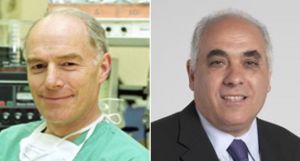History & Mission
The Intestinal Transplant Association (ITA) was born in 2003 reflecting the joint vision of the late Professor Richard Wood and Kareem Abu-Elmagd at the VIth International Small Bowel Transplant Symposium in 1999.

The participants in the VIIIth International Small Bowel Transplantation Symposium held in Miami on September 13, 2003, unanimously voted to establish the Intestinal Transplant Association (ITA) as a formalized and unified group of professionals with a common interest in intestinal failure, intestinal rehabilitation, and intestinal transplantation. This proposal was later put forth before the Council of The Transplantation Society (TTS) who accepted the ITA as a Section within The Transplantation Society.
Vision
Excellent physical and emotional health for all people with intestinal failure through rehabilitation and transplantation.
Mission
- Optimize the lives of intestinal failure patients worldwide through innovative nutritional, medical, psychosocial, surgical and transplant research and therapies.
- Maintain global leadership through a multidisciplinary approach to intestinal failure, rehabilitation and transplantation.
- Advance the support for all professionals working in the field of intestinal transplantation and rehabilitation with regard to education, policy, research and advocacy.
Values
- Excellence: Promoting innovative clinical, basic and translational science through multidisciplinary teamwork.
- Collaboration: Working closely with patients, IIRTA members, scientific societies, health organizations, and governments.
- Advocacy: supporting the patient’s voice in speaking as a unified influence in issues of concern to the IF and Intestinal transplant community.
- Integrity: Acting on the highest standards of ethical practice.
Note: Amended on December 9, 2019.
Goals
- Enhance communication and organizational effectiveness by using the TTS administrative support to hold quarterly Council meetings, organize biannual symposium, periodic newsletters, and other scientific activities.
- Create a community of practice through development of clinical practical guidelines and educational materials.
- Facilitate research by creating a repository of information and fostering proposals to enhance the scientific and academic mission of the Intestinal Transplant Registry (ITR).
- Increase membership by outreach to other relevant scientific communities including gastrointestinal associations, transplant societies, and other allied health and patient advocacy organizations.
Social
Contact
Address
International Intestinal Rehabilitation & Transplant Association
c/o The Transplantation Society
740 Notre-Dame Ouest
Suite 1245
Montréal, QC, H3C 3X6
Canada


